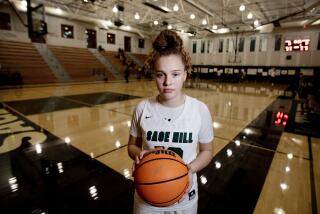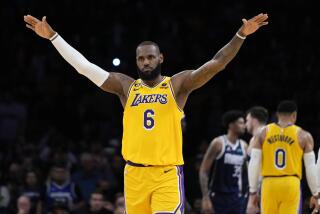NBA NOTES : Another Short Season Ahead for Tarpley?
- Share via
Clifford Ray is employed as a “special assignments coach” by the Dallas Mavericks. The current translation is that Ray is Roy Tarpley’s baby-sitter. When Tarpley missed a Mavericks practice last week, Ray searched for Tarpley in places where Tarpley was a regular. Where Ray looked is significant to Tarpley’s NBA future.
Nightclubs. Bars. Places where alcohol is served. Places where a two-time loser can easily be tempted. Tarpley has two strikes in the NBA’s anti-drug program. One more, and he will be banned from the league for at least two years.
So why does he go to bars? Simple. Tarpley is 24 years old. He likes to hang out. And perhaps he figures that because he spent 49 days in a California substance-abuse center last season, he can handle the temptation.
Tarpley, in short, probably will not have an NBA career that isn’t interrupted for at least two years. And what a gigantic waste. At 7-foot, 246, he is the best combination inside-outside man in the NBA. He led the league in rebounds per minute in each of hit first two NBA seasons. And he is a proficient shooter from anywhere inside 18 feet. There may be only one big man in the league better than Tarpley -- Akeem Olajuwon. In terms of basketball talent, Tarpley is Patrick Ewing’s equal, and may even be better.
But obviously, one Patrick Ewing is more desirable than 12 Roy Tarpleys. A team with Tarpley’s talent might be able to win the NBA championship. But, because of his lifestyle, his team also could as easily be the top rehab volleyball team in the world.
Volleyball is part of the recreation at the rehab clinic. And Tarpley is good. Unfortunately, if he becomes a full-time, rehab volleyball player, his five-year, $9-million deal with the Mavericks will be voided.
On one hand, it is tempting to feel sad for Tarpley. He is a tremendously likeable person. He has a natural, sort of naive sense of humor that is appealing. When he was a rookie, he would leave Reunion Arena after a game, go to a nearby store, buy a six-pack of beer, a large package of chips and a bottle of Tabasco sauce. He would go home and consume it all, heavy on the sauce. When asked about his eating habits, he would say, “I love Tabasco sauce. When I was a kid, I used to drink it right out of a bottle. I’m serious. But when I went to the bathroom, I’d be hurtin’.” He was like that -- full of funny, silly one-liners.
But, on the other hand, it is difficult to feel too sorry for Tarpley because he has received nothing but support since his first bout with cocaine as a pro sent him to a rehab clinic. Tarpley’s mother was an investment banker in New York. She gave up her job to move to Dallas to live with her son. Two years ago, the Mavericks employed a drug counselor to accompany Tarpley on trips. Mavericks owner Donald Carter even attended Alcoholics Anonymous and Cocaine Anonymous meetings with Tarpley. But it hasn’t seemed to matter because Tarpley continues to be an adolescent in a man’s body. After his first strike, Tarpley discontinued attending meetings, which are considered vital, because he figured he didn’t need them. He was wrong.
Now he figures he can go to bars. Each aftercare program is designed to address the problems of the individual. If Tarpley’s NBA-approved drug counselors find out that Tarpley has drunk an excessive amount of beer, they can suspend him without pay indefinitely, although he would not incur a third strike unless he used cocaine or heroin. Still, if the counselors say he doesn’t play for a year, then, under terms of the anti-drug agreement, he doesn’t play, and he doesn’t get paid.
Privately, several of Tarpley’s teammates say they don’t believe he can avoid a third strike. It seems that Tarpley continues to believe he has beaten something that continues to beat him. It could be another short season for Roy Tarpley.
The Houston Rockets say Akeem Olajuwon is no longer taking blood thinners to combat the phlebitis that hospitalized him for eight days in the summer and prevented him from playing in the exhibition season. Rockets Coach Don Chaney said Olajuwon will be his starting center when the Rockets open the season Friday in Los Angeles against the Clippers.
“I would say he’s not at 100 percent,” Chaney said, “but he is improving on a daily basis. He’s about 75 percent. The key would be stamina more than anything else. We will monitor Akeem as we go and watch out early for fatigue.”
Chaney said Olajuwon will play in short stretches of five or six minutes during the first two weeks of the season and will play about 30 minutes a game. Then Chaney hopes to increase his playing time to 36-38 minutes a game.
Chaney said doctors have assured him that it is unlikely Olajuwon will have a recurrence of the phlebitis. But he noted that it would be difficult for the Rockets to be successful without Olajuwon, which is a little like saying it would be difficult for a gelding to be a stud. No kidding, Don.
One method Lakers center Vlade Divac uses to learn English is to watch movies or television. The Yugoslav listens to phrases, then tries them out on teammates and reporters at practice. Recently, Divac watched a movie, and thought he had picked up how to greet people in the morning. So that morning, whenever Divac saw someone for the first time, he said, “Goooooood Morning, Vietnam.” He thought that was how all Americans did it. Now if Divac can only develop an interest in old TV sitcoms, he can turn to his wife, Snezana, before they go to sleep, and say, “Goodnight, Gracie.”
More to Read
Go beyond the scoreboard
Get the latest on L.A.'s teams in the daily Sports Report newsletter.
You may occasionally receive promotional content from the Los Angeles Times.










